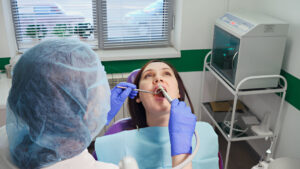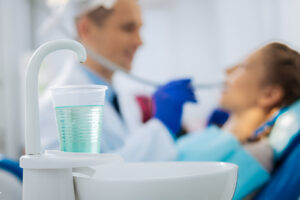So, you’ve had a dental crown for a while, and now it’s feeling a bit off. Maybe you’ve noticed a chip, or it’s become loose. If you’re wondering, “Can a dental crown be repaired?” the good news is, in many cases, the answer is yes! While crowns are designed to be long-lasting and durable, they can occasionally become damaged. But don’t worry – you won’t necessarily need a full replacement every time there’s an issue.
At Najmi Dental, we believe in preserving your smile, so let’s explore what can be done when your dental crown isn’t in top shape anymore.
What Causes Dental Crowns to Become Damaged?
Dental crowns are built to withstand a lot, but over time, they can still face wear and tear. Common causes of crown damage include:
- Chewing on hard foods: Crunching down on hard items like ice or nuts can cause chips or cracks in your crown.
- Injury or trauma: An accident or impact to your mouth can cause damage to your crown, much like your natural teeth.
- Bruxism (teeth grinding): If you grind your teeth, especially at night, it can put excess pressure on your crown, leading to cracks or loosening.
- Ageing: While crowns are durable, they aren’t indestructible. Over time, the materials used can weaken, leading to potential problems.
Understanding the cause of your crown damage is the first step in determining whether it can be repaired or if a replacement is needed.
Signs Your Dental Crown Needs Repair
Not sure if your dental crown needs attention? Here are some common signs that it might be time for a repair:
- Sensitivity: If your tooth feels more sensitive to hot or cold than usual, it could be a sign that the crown is no longer properly sealed.
- Pain or discomfort: Pain while chewing or pressure on the crowned tooth may indicate that the crown has shifted or loosened.
- Visible cracks or chips: Any visible damage, such as chips or cracks, can mean the crown is compromised and needs attention.
- Looseness: If your crown feels loose or unstable, it’s time to visit your dentist. A loose crown can let bacteria seep in, leading to decay beneath the crown.
If you notice any of these issues, it’s essential to act quickly. Ignoring a damaged crown can lead to more significant problems down the road, such as infection or damage to the underlying tooth.
Can a Crown Be Repaired or Does It Need to Be Replaced?
Whether your crown can be repaired or needs to be replaced depends on the extent of the damage. In some cases, a simple repair may do the trick. Here’s a breakdown of possible solutions:
1. Minor Chips or Cracks
For small chips or cracks, Najmi Dental can often repair the crown without needing to replace it entirely. We use composite resin or dental bonding materials to fill in the damaged areas, restoring both the function and appearance of your crown.
2. Loose Crown
If your crown has become loose, it’s likely that the dental cement holding it in place has worn down. In this case, your dentist will clean the tooth and the crown and reapply the adhesive to secure it again. This is usually a straightforward fix that doesn’t require replacing the crown itself.
3. Major Damage
If the damage to your crown is more severe—such as a large crack or a portion of the crown breaking off—then a replacement may be necessary. At Najmi Dental, we will assess the condition of your crown and tooth before recommending the best course of action. In some cases, a completely new crown may be required to ensure the tooth is properly protected.
4. Decay Under the Crown
Sometimes, the underlying tooth can develop decay if the crown is not properly sealed. If this happens, the crown will need to be removed so the decay can be treated. After addressing the decay, a new crown will usually be placed.
What to Expect During a Crown Repair or Replacement
If your crown needs repair or replacement, the process is typically straightforward and similar to when you first received your crown. Here’s what you can expect:
- Examination and Diagnosis: Your dentist will examine the crown and the surrounding tooth to determine the extent of the damage.
- Repair or Removal: If the crown can be repaired, the damaged area will be treated, and a dental bonding material will be used to restore the crown. If it requires replacement, the old crown will be carefully removed, and the tooth will be prepared for a new one.
- Temporary Crown (If Needed): If a new crown is required, a temporary crown will be placed to protect your tooth while the permanent one is being made.
- Fitting the New Crown: Once the new crown is ready, it will be fitted and adjusted to ensure a perfect fit. This ensures comfort and restores the full function of your tooth.
How Long Do Dental Crowns Last?
With proper care, dental crowns can last anywhere from 10 to 15 years—sometimes even longer. However, this depends on factors such as the material used, your oral hygiene, and habits like grinding your teeth or chewing on hard objects.
To extend the life of your crown, it’s important to maintain good oral hygiene by brushing and flossing daily, as well as attending regular check-ups at Najmi Dental. We’ll keep an eye on your crown and make sure it’s holding up well over time.
Preventing Future Damage to Your Crown
While crowns are designed to be durable, they’re not indestructible. Here are some tips to help prevent damage to your dental crown:
- Avoid hard foods: Steer clear of chewing on ice, hard candies, or other tough foods that could damage your crown.
- Wear a nightguard: If you grind your teeth at night, wearing a nightguard can protect both your natural teeth and your crown from excessive wear.
- Good oral hygiene: Brush twice a day, floss daily, and visit your dentist regularly. This helps prevent decay and keeps your crown in excellent condition.
Final Thoughts
Yes, a dental crown can often be repaired, depending on the damage. But whether it’s a simple fix or a full replacement, Contact Najmi Dental to restore your crown and keep your smile strong. If you think your crown needs attention, don’t hesitate to get in touch.
At Najmi Dental, we offer expert dental care to ensure your crowns—and your overall oral health—are well taken care of.


